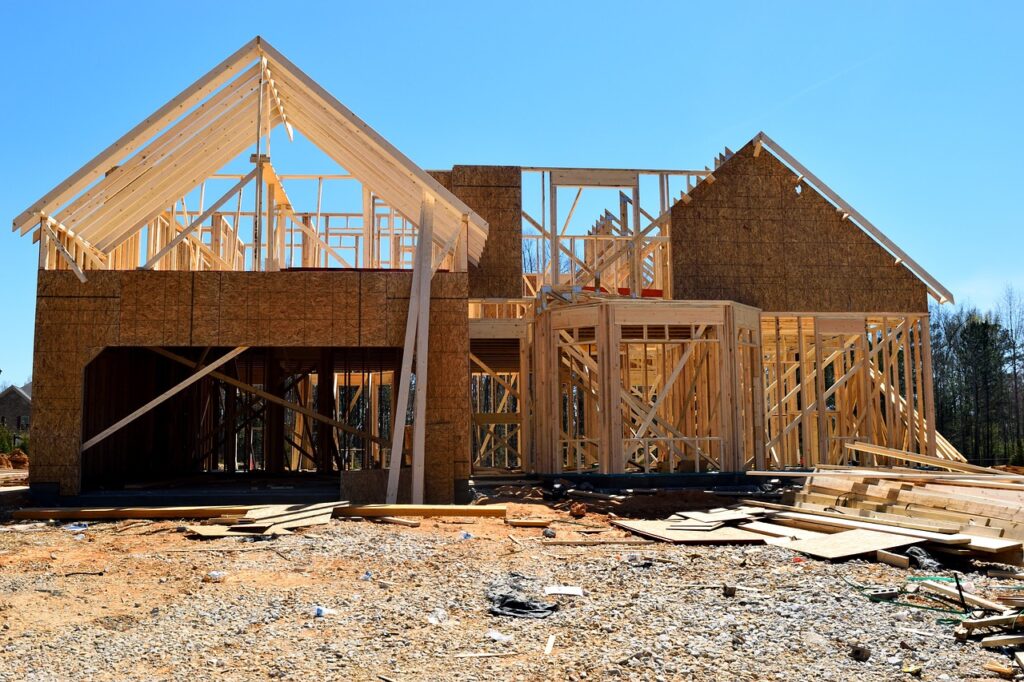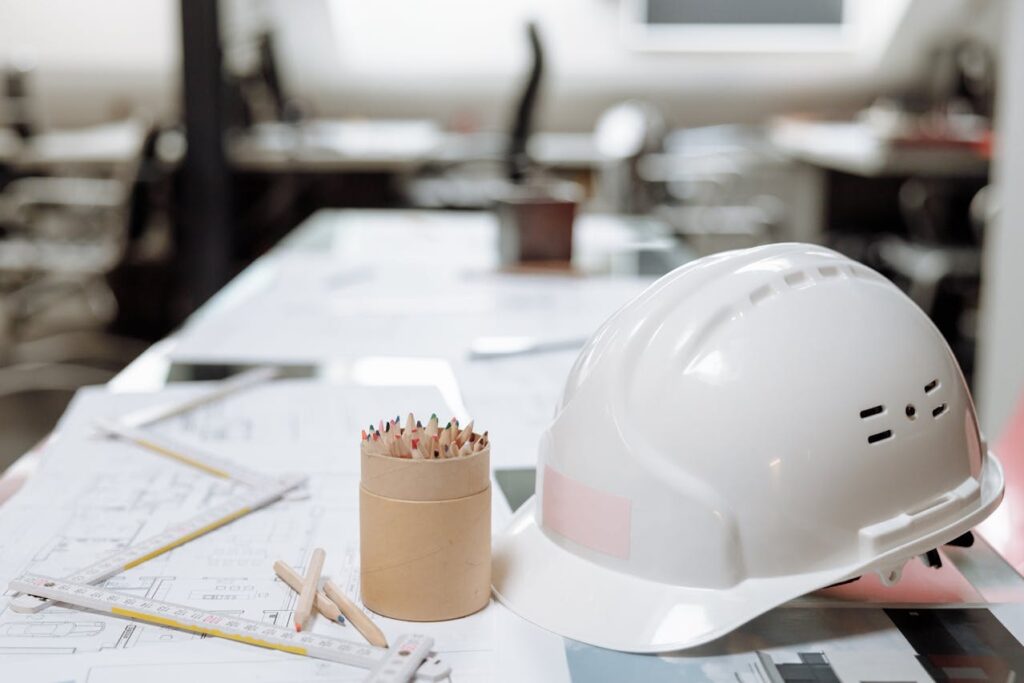Oregon’s housing market has been under increasing pressure in recent years, all thanks to a combination of growing household formation and a limited supply of homes. Nearly 45% of Portland’s housing market consists of homes built in the 1930s, 40s, and 50s, many of which require costly renovations or upgrades. Buying an older home also increases the risk of exposing your family to certain hazards like asbestos, outdated electrical, lead paint, and more.
From 2019 to 2022, the number of households grew by 77,000, but net housing units only increased by 50,900, which is causing occupancy rates to rise and vacancy rates to drop. This problem highlights the need for more new construction in the Beaver State. For many, a construction loan Oregon offers a great solution – build a modern, energy-efficient home while avoiding the headaches of buying an older property.
In this guide, we’ll be covering everything you need to know to maximize your building potential and personalize your living space with a construction loan Oregon and even touch on other lending options that we offer at Defy Mortgage, like DSCR loans.
Please note that we currently do not offer residential ground-up construction loans from primary residences at Defy Mortgage, and we do not provide owner-builder loans for primary residences. Builder approvals are required for select financing options for primary residences. Likewise, we do not currently offer loans in the state of Oregon.
Introduction to Construction Loans
What Is a Construction Loan?
Simply put, a construction loan is a short-term loan option that’s used to finance the construction of a new home or major renovations of an existing property. Rather than getting all of the funds upfront, this loan is disbursed in stages as construction progresses to make sure that the money is being used for its intended purpose. Interest is usually paid only on the funds released at each stage. When the project is complete, many construction loans automatically convert into a permanent mortgage with a longer term.
Construction loans are considered non-QM (non-qualified mortgage) loans, meaning they aren’t required to meet the strict lending criteria set by the Consumer Financial Protection Bureau (CFPB). This allows lenders to set their own qualification criteria, which makes construction loans more flexible especially for unique or complex projects.
Purpose of a Construction Loan
The main purpose of a construction loan is to provide the necessary cash to build a new home and ensure that the borrower has access to enough funds throughout the construction process. The loan is meant to cover everything required to build the home, which we’ll explore in more detail in the next section. Since construction loans are disbursed in stages, it makes it easier to manage costs and keep the project on track. With this financing, you can focus on creating your dream home without worrying about the financial strain of upfront out-of-pocket expenses.

What Does a Construction Loan Cover?
Generally, construction loans cover:
- Land purchase (if included in the loan)
- Building materials (e.g., lumber, concrete, fixtures)
- Contractor and subcontractor labor costs
- Architectural plans and designs
- Permit fees and inspections
- Engineering fees for structural work
- Site preparation (e.g., clearing land, grading)
- Installing utilities (water, electricity, gas)
- Contingency funds for any unexpected expenses or cost overruns
Types of Construction Loans
Construction loans aren’t just one-size-fits-all – there are several types to accommodate the unique needs of different borrowers. Here are some common types of construction loans to consider:
- Construction-to-Permanent Loan: This loan covers the building phase and then automatically converts into a traditional mortgage once construction is completed without needing a second loan.
- Construction-Only Loan: A short-term loan that finances just the construction phase, which requires you to secure a separate mortgage once the home is built to repay the construction loan.
- Owner-Builder Loan: Designed for borrowers who plan to act as their own general contractor during construction.
- Renovation Loan: This loan is used to finance major home improvements or repairs. You can upgrade an existing property rather than build a new one from scratch.
Construction Loans for Builders and Investors
Construction loans can be a great tool for builders and investors to finance new builds or renovate existing properties. Leveraging construction loans gives investors a way to cover the upfront costs of building or improving properties, which creates opportunities to boost the property’s value. Builders and investors have a chance to unlock the potential for higher returns on investment since they can rent out or sell the completed properties for a profit. On top of that, construction loans provide the opportunity to finance multiple projects, making it easier than ever to scale real estate portfolios and taking advantage of prime investment opportunities.
Please note that we specialize in other non-qm alternatives such as DSCR loans and bank statement loans at Defy Mortgage. We do not currently offer loans in the state of Oregon.

Construction Loans for Homeowners
Beyond the benefits of construction loans for builders and investors, they also give homeowners the opportunity to build or renovate their dream home. A construction loan provides flexible funding that’s needed to turn a vision into reality. Whether you’re constructing a new home from the ground up or making major renovations, these loans help cover the costs of materials, labor, and other expenses. Another potential benefit is the potential for increased property value since customizing or upgrading a home can boost its value on the market. After the construction project is complete, homeowners can live in and enjoy the benefits of homeownership, all while having a custom home designed and tailored to their preferences.
Construction Loan Oregon Interest Rates
Just like other loan interest rates, the interest rates for construction loans in Oregon depend on several factors, including your credit score, the lender, and market interest rates. Keep in mind that construction loan rates are typically higher than traditional mortgage rates since lenders are taking on more risk without having a property as collateral. Before choosing a lender, consider shopping around for quotes to find out each lender’s terms and requirements.
Construction Loan Oregon Down Payment Requirements
Down payment requirements for construction loans vary by lender. Depending on the lender’s requirements and your credit score, you can expect to put down anywhere between 20-25% of the project’s estimated costs.
Construction Loan Oregon Closing Costs and Fees
When it comes to construction loan closing costs and fees, you can expect to see a range between 2-5% of the total loan amount. These costs usually include:
- An origination fee
- Appraisal fees
- Title insurance
- Inspection fees
- Legal fees
- Permit fees
- Credit report fees
Keep in mind that this isn’t an exhaustive list of all closing costs and fees. The amount of fees charged by lenders can vary based on their specific terms and policies.

Securing a Construction Loan in Oregon
Construction Loan Requirements
The exact qualifications for a construction loan depend on the lender that offers these loan options. To get a clear understanding of what you’ll need, we suggest reaching out to lenders directly.
Construction Loan Terms
Since construction loans are meant to be short-term, their terms are usually set for 12 to 18 months. You can typically choose between a variable or fixed interest rate, depending on your needs. During the loan term, some lenders allow interest-only payments to help you manage costs while construction is underway. On the other hand, some lenders also offer amortizing repayment options during construction, meaning both interest and principal are being paid. Either way, most construction loans shift to fully amortizing, longer-term mortgages once the project is complete.
Construction Loan Lenders in Oregon & Alternatives
A successful construction project starts with the right lender. When shopping around, inquire about their experience with construction loans, loan types, interest rates, and requirements.
Defy specializes in alternative financing like DSCR loans and other non-qm lending options offering flexible solutions for borrowers who don’t fit the traditional mold. Schedule a free consultation or call us at (615) 622-1032 and one of our mortgage experts would be happy to help!
Please note that we currently do not offer residential ground-up construction loans from primary residences at Defy Mortgage, and we do not provide owner-builder loans for primary residences. Builder approvals are required for select financing options for primary residences. Likewise, we do not currently offer loans in the state of Oregon.
Tips for Getting the Best Construction Loan
If you’re thinking of getting a construction loan, but aren’t sure if you’d qualify, consider the following tips to boost your chances of approval:
- Improve your credit score
- Save for a larger down payment
- Have a detailed construction plan
- Budget for unexpected costs
- Shop around and negotiate with lenders

Construction Loan Oregon Alternatives
Whether you’re an investor or a homeowner, there are plenty of other alternative lending solutions beyond just construction loans. Depending on your needs, a different loan may be a better fit for you.
Some other alternative financing options include:
- Bank Statement Loans: Designed with self-employed individuals and entrepreneurs in mind, you can use your bank statements to qualify for a home loan. No traditional income documents, like W2s, pay stubs, and tax returns, are required.
- P&L (Profit & Loss Statement) Loans: For business owners who have a CPA create a P&L statement for them each year, this loan option allows you to use these statements to qualify for a home loan.
- Fix-and-Flip Loans: For real estate investors who prefer fixing up an older, existing property, fix-and-flip loans provide financing for the purchase and renovation of a property. The goal is to add value, sell it quickly, and earn a profit.
- Fix-and-Hold Loans: Similar to a fix-and-flip loan, a fix-and-hold loan provides funding for the purchase and renovation of a property. However, this loan is for investors who plan on holding the property for a bit longer, rather than selling it immediately after completing renovations.
- DSCR (Debt-Service Coverage Ratio) Loans: For real estate investors who prefer to have income-generating rental properties, a DSCR loan allows you to qualify for an investment property loan based on the property’s income.
Construction Loan Oregon FAQs:
- What is a construction loan, and how does it work in Oregon?
A construction loan is a short-term loan used to finance building a new home from the ground up or major renovations to an existing home. In Oregon, the loan proceeds are usually disbursed in stages as the construction progresses. Some lenders also provide the option to convert it into a traditional mortgage once the project is complete.
- What are the qualifications for getting a construction loan in Oregon?
The qualifications for getting a construction loan vary depending on the lender. To get a more accurate picture of what you’ll need to qualify, we recommend reaching out to lenders directly.
- What is the typical interest rate for a construction loan in Oregon?
There is no typical interest rate for a construction loan Oregon since lenders factor in market conditions, your credit score, and the loan terms before providing an exact interest rate. However, they’re generally higher than traditional mortgage rates because of the increased risk associated with construction projects.
- Can I use a construction loan to buy land in Oregon?
Yes! You can use a construction loan to buy land in Oregon. Some lenders may also offer separate lot loans specifically for land purchases.
- What is the difference between a one-time close and two-time close construction loan in Oregon?
A one-time close construction loan combines the construction and permanent mortgage into one loan, which means you only need to close once. A two-time close construction loan has two closings – one for the construction phase and another for the permanent mortgage after construction is finished.
- How long does it take to get approved for a construction loan in Oregon?
On average, it can take anywhere between 30 to 60 days to get approved depending on the lender and how complex the project is.
- What are the down payment requirements for a construction loan in Oregon?
Down payments for construction loans in Oregon typically range from 20-25% of the project’s cost.
- What costs can a construction loan in Oregon cover?
A construction loan can cover a wide range of costs, including land acquisition, materials, labor, permits, and other related expenses like design and engineering fees. Some loans may also include contingency funds for unexpected expenses.
- Do I need to work with specific contractors or builders for a construction loan in Oregon?
Lenders typically require that you work with licensed and insured builders or contractors who have proven track records. Whoever you choose to work with will have to provide a detailed construction timeline, budget, and plans for the lender to approve.
- What happens if my construction project in Oregon exceeds the budget or timeline?
If your construction project exceeds the budget or the timeline, it’s important to let your lender know as soon as possible. You may need to request additional financing from your lender or plan to cover the extra costs out of pocket. While some construction loans include a contingency fund, exceeding the loan limit can lead to delays or require a new loan.
- Can I convert my Oregon construction loan into a traditional mortgage after construction is complete?
Yes! You can convert your Oregon construction loan into a traditional mortgage after construction is complete.
- How is the loan amount determined for a construction loan in Oregon?
The loan amount is typically based on the projected cost of the construction, including land acquisition and all related expenses. Lenders also take into account the property’s appraised value after completion and your ability to repay the loan.
- What documents are required to apply for a construction loan in Oregon?
Required documents typically include a detailed construction plan, builder’s contract, budget, land deed or purchase agreement, proof of income, credit report, and an appraisal of the land or project site. Some lenders may also request permits and insurance documentation.




